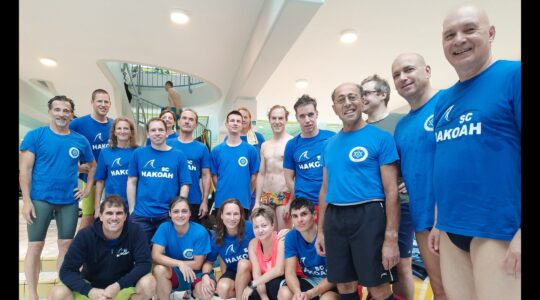(JTA) — When a group of mostly American Jewish baseball players arrived in Tokyo for the 2020 Olympics, they had multiple responsibilities.
First among them was to represent Team Israel in its first-ever Olympic baseball outing. Many of the players were new Israelis, having obtained citizenship just to satisfy Olympics eligibility rules.
But they were also tasked with making a movie about their experience. A documentary had followed Team Israel’s Cinderella run in the 2017 World Baseball Classic, and the filmmakers wanted to make a sequel. But there was a catch: No media was allowed in the Olympic Village in Tokyo, due to strict pandemic restrictions.
Instead, the filmmakers distributed small cameras to the players to document their own experience. The result is the new documentary “Israel Swings for Gold,” which premieres Saturday at the Atlanta Jewish Film Festival.
“It was sort of amazing, because they got stuff that we never would have gotten, had we had cameras there,” Daniel A. Miller, one of the filmmakers, told the Jewish Telegraphic Agency. “The intimacy that is offered, these moments where they win, and even when they lose, their sort of daily experiences with antisemitism.”

The official movie poster for “Israel Swings for Gold.” (Courtesy Ironbound Films)
Miller is one third of the team behind Ironbound Films, the production company that made “Heading Home: The Tale of Team Israel.” He said the reception of that movie had surprised him.
“‘Heading Home’ had this huge following that we never expected,” he said. “People loved seeing these players who grew up playing baseball through high school, through college, and they never really explored their faith so much. Their faith was baseball.”
The sequel follows the team from their Olympic qualifier in New York through their citizenship process, visiting Israel and ultimately playing in Tokyo. Ironbound was able to shoot all the footage in Israel and in the United States, but once the team arrived in Tokyo, the players were on their own.
Miller said making the film with the help of the players was “supremely interesting” — and that the resulting perspective widened the series’ lens on what it means to be an Israeli ballplayer.
“It was moving on to what being Israeli meant — associating with Israel and all its problems, and having to identify on a world stage with Israel,” he said.
The film includes moments like the moment of silence held during the opening ceremony to honor the victims of the 1972 Munich Olympics massacre.
It also shows the Israeli players being turned down by other countries’ athletes for the traditional Olympic pin-swapping — a detail that did not grab headlines at the time, but which corresponds with experiences that Israeli athletes have had on other stages.
Because it is shot largely by the players, the documentary takes on a real behind-the-scenes feel throughout — especially during scenes in the players’ Olympic Village dorms, where they cut each other’s hair, make TikToks and spend most of their time shirtless.
After its Atlanta debut this weekend, Miller said the film will be shown at Jewish film festivals across the country, including in New Hampshire and at the Gold Coast International Film Festival on Long Island. The documentary will also have a theatrical release, beginning in South Florida next month.
Miller said his team plans to make its next sequel at the 2023 World Baseball Classic, which takes place in Miami next month.
JTA has documented Jewish history in real-time for over a century. Keep our journalism strong by joining us in supporting independent, award-winning reporting.





